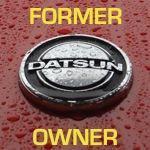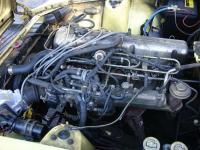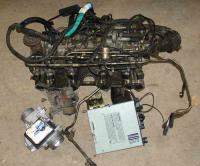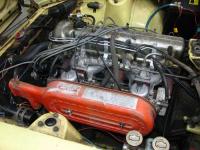Everything posted by Arne
-
'78 280z trans
No, the 5 speed was an option in '77 and '78.
-
What do you think about my new watch?
No problem, once it stops you can tear it apart and oil it with sewing machine oil and it will work again!
-
Other cars you own, or drive?
Sold my truck a number of years back. Taking my cue from the Europeans, both the Jetta and the BMW have receiver hitches on them, and tow a small utility trailer quite nicely. But I do agree, with that addition - if you own a house you've almost got to have either a truck or a trailer.
-
Clock Repair: Analog, 70-78 Z (Round)
I worked on mine for several hours before getting it to work reliably. (Still running, BTW.) Enrique's last post is accurate, and is part of what I did to finally get it going. The details of my repair: Oiling the motor - Look at the last picture I posted above. Notice the metal strap across the back of the motor. Slightly loosen the small screw under paint opposite the wires. The wire end of the strap can then be pivotted counter-clockwise to reveal the shaft bushing. Put a small drop of oil there, and immediately blot up any excess. Replace the strap and reapply some lock paint. (Nail polish works well.) Then remove the motor mounting screw (next to my fat thumb in the picture) and the mechanism mounting stud opposite the screw. The motor can then be gently pulled away from the clockworks. Connect 12 volt power and let hte motor spin free for a short while so that you know it works well. Replace the motor. Clockwork pivots - I did not loosen the screws that Enrique mentions, but I did oil (ever so sparingly) all the pivot points. Just like on the motor, apply the smallest drop you can, and immediately blot as much of it back up as you are able. Doing those two things got mine working well, in fact it might be working too well, as it gains a 2 or 3 minutes per week now. Which is close enough for me.
-
Other cars you own, or drive?
No trucks, SUVs or automatic transmissions for my wife and me. Currently: 1996 BMW 328i Sport 1991 VW Jetta GLI 16v (bought new in '91, 102k miles) 1992 BMW K75RT (only two wheels) Notable previous vehicles: 1981 BMW 323i (gray market European model, think 320i with a 2.3L six) 1990 VW Corrado G60 1967 MGB (went through the same process the 240Z is now experiencing 1981 Scirocco S (much modded) Numerous motorcycles and ATVs 1974 Datsun B210 hatchback (only previous Datsun) 1975 Chevy Cosworth Vega (not much like a regular Vega - 2.0 all-aluminum 16v twin cam with a true Cosworth head and factory fuel injection, one of 3600 built)
-
Replacing the exhaust. Info/ideas?
Find a good local shop, tell them what you want and have them custom build it. Ask the local muscle car and hot rod crowd who does the best exhaust work, and go there. You will get a better fitting system, they can help you select the proper system for sound, and the price will be about the same as the commercial systems.
-
Reverse Switch - Lost all wires but one (however I know switch works).
You know, if the switch on a '72 is the same as on my early '71, both connectors may be the same. Since the switch simply completes the circuit, it doesn't matter which wire is connected to which. When I did the transmission swap on my car I recall this being the case, both pigtails on the switch were black and both had male bullets, IIRC.
-
Maybe I'm too much of a purist, but...
He's been trying to sell it on Craigslist for several months, for about that same $12,500 price. I was hoping to see it in person at the Canby show, but it wasn't there. Not quite my cup of tea, either.
-
Appliance wheels, how rare?
Well, if they are the ones I am imagining in my mind, I don't think they are all that common these days, but probably not so rare as to be super valuable. Appliance got blind-sided in the US market when Enkei hit, and didn't have the equipment to make wheels of that type and quality. So they bought wheels from Japan, added their own center caps and re-boxed them as Appliance. IIRC, the most common Appliance wheels of this type were stamped or cast "Upsilon" on the back side of the wheel. But you may have something totally different. Please post a picture.
-
New tach problem - 240Z
Sounds logical, but before I install teh other one, can anyone think of anything in the car's wiring that could cause this failure? No sense in doing the same thing to another one, you know.
-
Identify seat reclining mechanism?
I actually have both sides. The mouting tabs on the covers are - of course - broken, but I have an idea or two on that. If it works I'll take pictures and share.
-
Identify seat reclining mechanism?
Thanks, Carl. Thats kind of what I thought. So they were probably the originals for the car I'm parting out.
-
Identify seat reclining mechanism?
Can anyone tell me what year these seat recliners would have originally come on? They were in my late '71 parts car (4/71). I think I'll put them in my Series 1, even though they're not really correct, because they seem much more convenient.
-
New tach problem - 240Z
Well, I have a spare tach from the pats car, so if it's dead and can't be repaired easily...
-
New tach problem - 240Z
OK, here's a new one on me. The tach in my early '71 240Z (4 wire) suddenly this afternoon started to peg the needle at 8000 RPM any time the key is turned to the Run position, whether the engine is running or not. I suspect a problem with the tach itself, not the wiring as the ignition appears to be working fine, since the car starts and runs normally. Any thoughts?
-
Fluid Rundown - For MY information
DOT 5 is NOT compatible! Going to DOT 5 would require a complete rebuild of the entire brake system - every single rubber bit replaced, and the metal lines flushed with denatured alcohol. Dot 3 is still easily available, DOT 4 will work as well. There's no real benefit to DOT 4 though, so DOT 3 (which is generally cheaper) will be fine. Castrol is fine, as mineral oil goes. Any name brand ATF should work fine.
-
L28 in 240Z
That makes it considerably more difficult to make work well. My car had the injection from an '83 280ZX on it when I bought it. I found that trying to get it all to work well with the early car's wiring and fuel plumbing was hard to do, it seemed like one cobbled-up system connecting to another cobbled-up sub-system connected to...Unlike carbs, the factory injection system is not typically a stand-alone unit. The entire fuel system has to be matched and compatible. Certainly the best way to do it would be to use the entire system from a single car, but the hidden stuff is what bites you in the end. As an example, the entire engine/injection in my car was from an '83 280ZX. They plopped the engine in, welded the stock exhaust up to the ZX downpipe, connected some of the wires, installed the ZX fuel pump and thought it was done. But the temperature gauge didn't work, because the ZX sender was different to send temperature data to the injection computer as well. There were left-over wires hanging here and there with nothing on the early harness to connect them to. Other places the wires on the injection harness were just snipped off. ("Were those wires important? What did they do?") They kept the factory fuel piping for both the feed and the return - the feed was a bit small and caused the pump to work harder than it should, and the return line dumps into the tank in a different place than the injection return and made horrible noises in the tank from the returned fuel spraying back into the tank under pressure. And the oxygen sensor didn't work well, apparently due to the flutuations in the voltage supplied through the early car's wiring. The injector flow rates were unstable, apparently due to the pump working so hard. All in all, my car is SO much better with the carbs back on it again. I'm a fairly experienced mechanic, and I don't think I'd want to try to do that swap myself due to the work it would take to do it right. The 240Z SU carbs are simple in comparison, and perform just as well if they are properly tuned. In summary, I went back to the carbs and couldn't be happier. The wiring and fuel piping in the early cars is just not quite up to the injection, in my opinion. I'm certain that there are plenty of people who will tell you they've done it, but I have seen the result in my car and would never try again. If you really want a Z with injection, I'd recommend buying a 280Z instead.
-
Received the car I purchased off Ebay today.
Depends on your definition of a '70. The automatics began production in 9/70. Some of them were titled as '70s, most were probably titled as '71s.
-
Triple Weber Downdrafts?
I think you're right, Stephen. I was thinking MGB when I looked at that one, but I haven't had a B manifold in my hands for over 10 years.
-
Triple Weber Downdrafts?
I don't think those are all three from the same car. The two outer ones look like the typical Cannon dual Weber conversion, they bolt to the existing manifolds. The inner one is from something else.
-
L28 in 240Z
It's done all the time. My '71 has one in it now. Simplest is to use the carbs and such from the L24. The largest "difficulty" is in the exhaust manifold, most of the L28s have round exhaust ports and so you'll need a different manifold or header. Pretty much everything else is the same. (unless you want to use the injection, which takes a lot more work.)
-
Matching #'s early1971 car!
Early production (Series 1 cars) ended sometime during January '71. You can find both early and late '71s with 1/71 build dates.
-
Matching #'s early1971 car!
Actually, that's a late '71 with the wrong hubcaps. That said, it looks like a really good car.
-
Lubrication Recommendations
I use Redline in most everything that's not a motor, and either Mobil 1 or Castrol Syntec in the motors.
-
Give your opinion
Wrong. The P90 has square ports, that's part of what makes it good. And I believe you can put the external oiler on any L-series head, as long as you use an externally oiled cam. Sounds to me as though it's time you do some homework before you spend any money.









